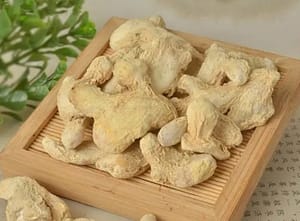Ginger is one of the most commonly used herb/food in TCM (Traditional Chinese Medicine) and there are two types out there – the fresh kind (which you commonly see in the market), and the dried kind (which are typically sold in TCM retail shops only).
In the rest of this post, let me share more about each type of ginger and how it can help you!
Fresh Ginger Properties

The thermal nature of fresh ginger is warm, hence it is not advisable to eat it too frequently (for instance, eating it daily will be too much for the body).
Due to its warm thermal nature, people who are down with heat-type flu or sore throat (which is commonly linked to heat-related illness) must avoid consuming fresh ginger.
Fresh ginger can benefit the lungs, spleen and stomach organ meridians.
One of the properties of fresh ginger is that it can help to stop vomiting. This is why sometimes a person can feel better after taking ginger tea/drink/candy when he/she is experiencing nausea from car or sea sickness.
Another property of ginger is that it promotes sweating, which helps to reduce body heat – this is the reason why most TCM flu medicine contains ginger as an ingredient.
In addition, drinking ginger tea is good for cold-type coughs as ginger has the property of warming the lungs which helps to alleviate cold-type cough symptoms.
Do take note to consume fresh ginger products only when the person is having a cold-related illness like cold-type flu. Click here to find out how to tell if a person is having cold-type flu.
Dried Ginger Properties
 Unlike fresh ginger, dried ginger is consumed more as a herb than a food, and it is usually sold only in TCM retail shops.
Unlike fresh ginger, dried ginger is consumed more as a herb than a food, and it is usually sold only in TCM retail shops.
The thermal nature of dried ginger is hot. Hence, do avoid consuming dried ginger if you have a sore throat or heat-related illness (which will make things worse).
Dried ginger can benefit the spleen, stomach, lungs, heart and kidney organ meridians.
One of the properties of dried ginger is that it helps to warm the body. This is why people take dried ginger when they have phlegm or moisture in the lungs that is causing them to cough and throw up phlegm. Dried ginger is known for its benefits in dissolving phlegm in the lungs.
Last but not least, the old saying goes that eating ginger at night is like eating poison. The best time to consume ginger (both fresh and dried types) or drink ginger tea is in the morning. Do your best to follow this advice if you drink ginger tea regularly.
I hope you find this article useful!

Hello. I thank you in advance for your help.
I would like to find a kind of ginger that I had 50 years ago, that I was given by a Chinese lady to help with my cough. The ginger was moist, dark green – almost black, and fiberous. Looked kind of leathery. I chewed on it, and the liquor I made by chewing on it helped my cough. It was the only thing that would help me. Does this sound like black ginger or anything you know of?
Sorry, Nori.
I am not sure what kind of ginger is it based on your description.
But I am equally keen to find out what exactly is it.
Do let me know also if you managed to find out eventually.